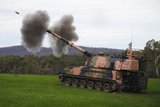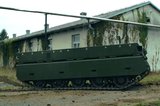Lithuania looks to NATO to deter Russia, dismisses European Army
The idea of a European Army was dismissed by a Lithuanian defence official who said that NATO nations should continue to increase spending within the existing organisation instead, especially with the rising threat from Russia.
Speaking to Shephard, Giedrimas Jeglinskas, Vice Minister of Defence to Lithuania, rejected the idea of a European Army, highlighting that NATO was the key to deterring Russia.
Any movements towards creating a European Army would overlook the resources, systems and readiness that NATO already has in place.
He welcomed US President Donald Trump’s comments that more countries needed to be pulling their weight in bolstering defence
Already have an account? Log in
Want to keep reading this article?
More from Land Warfare
-
![World Defense Show 2026: DOK-ING working on MV-8 variants and reveals specs ahead of Eurosatory]()
World Defense Show 2026: DOK-ING working on MV-8 variants and reveals specs ahead of Eurosatory
The Croatian company began the development of the MV-8 modular uncrewed platform in the early 2020s. Specifications for the vehicle were revealed to Shephard at World Defense Show 2026.
-
![World Defense Show 2026: Turkish and European industries will cooperate, says Aselsan boss]()
World Defense Show 2026: Turkish and European industries will cooperate, says Aselsan boss
Aselsan was formed 50 years ago in response to difficulties Turkey was facing in sourcing major systems internationally. While some challenges still remain, company president Ahmet Akyol believes a rapprochement is possible.
-
![World Defense Show 2026: Russia reveals details of new loitering munition]()
World Defense Show 2026: Russia reveals details of new loitering munition
The Kalashnikov RUS-PE cannister-launched man-portable loitering munition was displayed as a model at World Defense Show 2026 with a company official telling Shephard it was “in service and in low-rate initial production”.
-
![World Defense Show 2026: MARSS displays new Nation Shield air defence C2 system]()
World Defense Show 2026: MARSS displays new Nation Shield air defence C2 system
Nation Shield is the latest iteration of the MARSS C2 system and is designed to provide C2 further forward along with more capable air defence.























